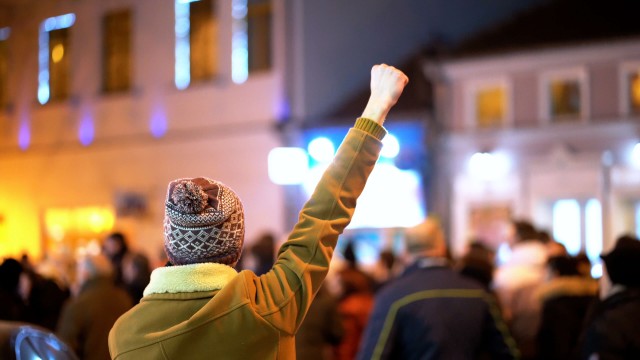THIS IS YOGA | Self-Care for the Activist

This is a time for change. This is an opportunity. This is Yoga. We invite you to explore the third in a series of readings from Kripalu in which we will share how yoga’s ancient wisdom provides guidance on mindful action in a world in turmoil.
November 5, 2020
There is a well-worn metaphor for the activist to be found in airline safety instructions, which admonishes us to place an oxygen mask on oneself before placing it on a child or companion with whom we may be traveling. It is critical that we practice self-care as a prerequisite for serving the needs of another human being—in a state of depletion, one cannot properly care for others.
Avoiding burnout is always important for those who serve, especially in these most challenging and stressful times. Yogic philosophy, specifically what we call ‘yoga off the mat’, gives us several effective ways to practice mindfulness. In particular, we can turn to the Niyamas for guidance.
Niyamas—inner observances, positive duties
The five Niyamas are tools of inner strength and self-reflection, used to cultivate health and happiness. The first is Saucha, meaning purity or cleansing. After the last several weeks, we all need to ‘take a breath’, and a deep cleansing breath is exactly the kind of practice that Saucha encourages. It also directs us to work consciously at decluttering and quieting the 'noise' in our environments so we can return peacefully to self.
Santosha encourages contentment or feeling at ease and in acceptance of yourself and your circumstances. Take the time to do things that nurture you. It could be cooking, creating art, or just getting out into nature to settle the mind. The idea is to do what you know will bring you peace and a sense of calm.
Tapas encourages us to channel our internal fire so that we may cultivate discipline and strength. That same energy that fueled us to volunteer or to stand up for others, can now be channeled into one's own on the mat practice. The work is to engage in a discipline that cultivates strength and will power—strength in body, mind, and spirit.
Svadhyaya is the practice of self-study and self-learning. There are many approaches that invite us to see our true nature. Journaling is one such approach as it provides a vehicle for self-reflection and a free flow of experience onto the page. Of course, the best practice for self-knowledge is most certainly meditation. When we meditate, we enter into the still space of ourselves, connecting to the deep inner wisdom that is otherwise effectively drowned out by the distractions of daily life.
Finally, there is Ishvara Pranidhana, meaning surrender. The yogic path of service in order to help improve our world is a long one and can be fraught with attachment to personal identity and achievement. Traveling this path can take a toll. Pranidhana encourages devotion and surrender here, practice becomes filled with the grace of identifying with something greater than our personal selves, allowing us to experience peace and love.
May this be a moment of surrender and peace for all of us, as we nourish ourselves in preparation for the road ahead.
We invite you to share your feedback in this continued discussion on the role of yogic philosophy in the modern world. This is a conversation that welcomes all voices and backgrounds and we encourage conversation. Please reply via this secure form, and know that while we read every response, we do not have the ability to reply to all entries.
Barbara Vacarr, PhD, Kripalu's CEO from 2016–2021, is a psychologist, adult educator, and lifelong meditator who writes about and speaks to topics related to mindfulness, compassion, conscious leadership, and activism.
Full Bio and Programs